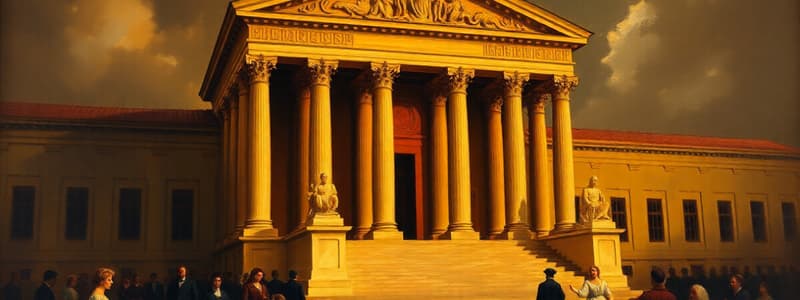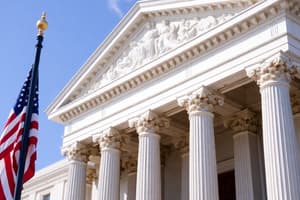Podcast
Questions and Answers
What is the highest federal court established by Article III of the U.S. Constitution?
What is the highest federal court established by Article III of the U.S. Constitution?
- Federal Circuit Court
- Supreme Court of the United States (SCOTUS) (correct)
- U.S. District Court
- Court of Appeals
Federal District Courts have jurisdiction over federal criminal cases.
Federal District Courts have jurisdiction over federal criminal cases.
True (A)
How many justices make up the Supreme Court?
How many justices make up the Supreme Court?
9
The federal courts hear civil cases where the parties are from different states disputing more than $_____
The federal courts hear civil cases where the parties are from different states disputing more than $_____
Which of the following issues is NOT heard by the Federal Circuit?
Which of the following issues is NOT heard by the Federal Circuit?
Federal court judges are appointed for life and can only be removed through impeachment.
Federal court judges are appointed for life and can only be removed through impeachment.
What are the names of the courts that hear appeals from the federal district courts?
What are the names of the courts that hear appeals from the federal district courts?
Match the following federal court types with their characteristics:
Match the following federal court types with their characteristics:
What was the primary outcome of the Brown v. Board of Education case?
What was the primary outcome of the Brown v. Board of Education case?
The Supreme Court of the United States (SCOTUS) must hear all petitions for certiorari.
The Supreme Court of the United States (SCOTUS) must hear all petitions for certiorari.
What is the percentage of federal cases preferred by SCOTUS compared to state cases?
What is the percentage of federal cases preferred by SCOTUS compared to state cases?
The losing party at the federal appellate level or state supreme court is the one to appeal to ______.
The losing party at the federal appellate level or state supreme court is the one to appeal to ______.
Match the following attributes with their descriptions:
Match the following attributes with their descriptions:
How many justices must agree to grant a petition for certiorari?
How many justices must agree to grant a petition for certiorari?
Once a case is decided, SCOTUS does not release their opinions to the public.
Once a case is decided, SCOTUS does not release their opinions to the public.
What significant issues does SCOTUS often decide on?
What significant issues does SCOTUS often decide on?
Flashcards
Federal Court System
Federal Court System
The judicial branch system dealing with federal laws and selected civil cases.
Federal Courts Jurisdiction
Federal Courts Jurisdiction
Federal courts hear cases based on federal law or civil disputes between states involving more than $75,000.
Supreme Court
Supreme Court
Highest federal court established by Article III of the Constitution.
US District Courts
US District Courts
Signup and view all the flashcards
Federal Circuit Courts
Federal Circuit Courts
Signup and view all the flashcards
Federal Circuit
Federal Circuit
Signup and view all the flashcards
Judicial Appointments
Judicial Appointments
Signup and view all the flashcards
Supreme Court Justices
Supreme Court Justices
Signup and view all the flashcards
SCOTUS
SCOTUS
Signup and view all the flashcards
Brown v. Board of Education
Brown v. Board of Education
Signup and view all the flashcards
Petition for Certiorari
Petition for Certiorari
Signup and view all the flashcards
SCOTUS Discretion
SCOTUS Discretion
Signup and view all the flashcards
Oral Arguments
Oral Arguments
Signup and view all the flashcards
Judicial Review
Judicial Review
Signup and view all the flashcards
Lifetime Appointment
Lifetime Appointment
Signup and view all the flashcards
Case Acceptance Condition
Case Acceptance Condition
Signup and view all the flashcards
Study Notes
Federal Court System
- The United States court system is the judicial branch.
- Federal courts hear cases involving federal law or civil cases between states with disputes over $75,000.
- The Supreme Court (SCOTUS) is the highest court, established by Article III of the U.S. Constitution.
- Congress has the power to create lower federal courts.
- The U.S. has 94 district courts, each with a federal trial court (including bankruptcy courts).
- Each district is part of 12 regional circuits, each with a court of appeals to ensure judges apply the law correctly.
- A federal circuit court handles cases nationwide but only on specific issues (e.g., international trade, patent law, veterans' issues, monetary claims against the government).
Federal Court Judges
- Appointed by the President and confirmed by the Senate.
- Protected from removal except through impeachment.
Supreme Court (SCOTUS)
- Composed of 9 justices.
- Interprets the Constitution and sets legal precedents.
- Decisions are made by majority rule.
- All U.S. courts must respect, and follow, SCOTUS decisions.
SCOTUS Case Procedures
- Thousands of petitions for review (certiorari) are filed annually.
- SCOTUS has discretion on which cases to hear (approximately 80 cases/year).
- Both the petitioner and respondent submit legal brief arguments for/against the case.
- Justices hold oral arguments, allowing 30-minute presentations from each side.
- Justices then meet privately to discuss and draft opinions.
- Decisions and court opinions are then made public.
- SCOTUS frequently revises or negates lower court decisions.
Significant SCOTUS Cases
- Brown v. Board of Education (1954): Overturned segregation in public schools.
Studying That Suits You
Use AI to generate personalized quizzes and flashcards to suit your learning preferences.



